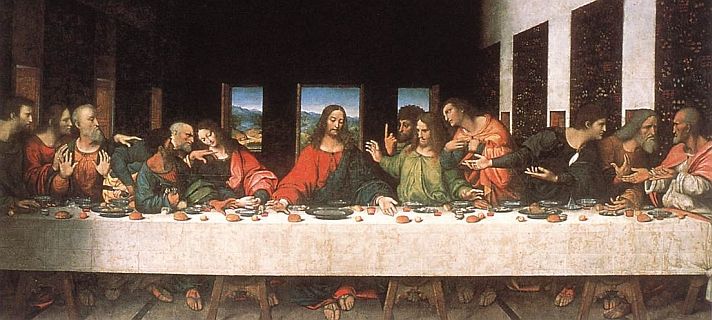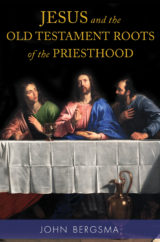By John Bergsma
Dr. John Bergsma is Professor of Theology at the Franciscan University of Steubenville. A former Protestant pastor, Dr. Bergsma has authored several books on Scripture and the Catholic faith, including Jesus and the Old Testament Roots of the Priesthood.

I grew up in a Christian tradition vigorously opposed to calling their clergy “priests.” We were doctrinally committed to the view that the only priesthood in the New Covenant was the common priesthood of the faithful: every baptized believer shared in Christ’s priesthood (Rev 1:6) and was called to “present [their] bodies as a living sacrifice” to God (Rom 12:1).
Of course, in a situation where everyone is a priest, it is the same in practice as no one being a priest. We denied that there was any difference in state or character between believers—no one was spiritually set aside to God or consecrated as a sacred person within the Church. The clerical role was (at least theoretically) merely functional rather than ontological. That is, it merely concerned what one did, not who one was. Our preachers, pastors, or ministers—the terms could be used interchangeably—were, in theory, merely men who led worship and preached because someone had to do it. And anyone else who happened to have the requisite gifts could do the same things if they so wished. In practice, however, we did tend to revere our clergy, and the older generation still referred to the minister as the “Domine,” Latin for “Lord”!
Of course, I did grow up surrounded by many Catholics, as my father was a military chaplain. Upon discovering that my dad was a cleric, I would have to correct the inevitable response: “So your dad is a priest?” or “You mean your father is a Father?” No, I would explain, he is not a priest, except in the sense that all of us are baptized into Christ’s priesthood. And no, he is not a “Father” in a clerical sense, because Jesus says clearly, “call no man your father on earth” (Matt 23:9).
The story of how I grew up to be a minister myself but then was dragged kicking, if not screaming, into the Catholic Church by the inexorable logic of the Scriptures and the early Church Fathers has been told in a different book and in various talks. Suffice it to say that a good Catholic friend got me to read the apostolic fathers while I was in my doctoral program in Scripture, and what I found in them flipped my whole view of Church history and the development of Christian doctrine upside down, with the result that gravity then pulled me into the Church.
Fast-forward several years, and Pope Emeritus Benedict XVI declares a “Year of the Priest.” A local parish invites me to teach some sessions of their adult education class, and suggests “Priesthood in the Bible” as a topic, in keeping with the theme of the holy year. I had come around almost to the opposite place from my childhood in terms of my understanding of priesthood in Scripture.
I grew up suspicious of priesthood in Scripture, although I had never gone in for the German liberal Protestant reading of the Old Testament that isolated all the priestly and liturgical material and assigned it to a post-exilic (i.e., after 537 BC) author or authors of the so-called “Priestly School” (typically just “P” for scholars). Even as a Protestant, I had a strong suspicion that this whole reading of the Old Testament, especially the Pentateuch, was a retrojection of Lutheran or post-Lutheran antagonism for the Catholic priesthood onto the Old Testament’s Israelite priesthood. Everything associated with priests was categorized as dull, pedantic, lifeless, legalistic, ossified, etc. They downplayed the fact that several charismatic (in the general sense) personalities of the Old Testament were priests or Levites themselves.
I rejected that critical view stemming from nineteenth-century scholarship, but still did not appreciate the role of the priest in the Bible. But now, it was all different: from Adam in the Garden of Eden to the “priests of God and of Christ” (Rev 20:6) at the end of the Book of Revelation, I could see priesthood as a major thread holding together the biblical storyline. In a sense, the story of salvation was an account of the gift of priesthood to Adam, his loss of it in the Fall, and the long process of restoring his descendants to a priestly status over the centuries, culminating in Christ.
That’s the story that I recount in my new book, Jesus and the Old Testament Roots of the Priesthood.
I still believe, as I did in my youth, that we are all baptized into Christ’s priesthood: this is good Catholic doctrine. However, I also now appreciate with ever greater clarity that Jesus did intend for there to be a ministerial priesthood in the New Covenant: an order of men succeeding from the Apostles that would perform for God’s people the usual roles assigned to priests: leading worship, offering sacrifice, interpreting God’s law for daily life, and mediating the forgiveness of sins, to mention a few.
I offer my new book—which began as some informal parish talks and still has that conversational style—to all Catholics who would like to understand and deepen their faith and better practice their own “royal priesthood.”
But I also offer it in a particular way to seminarians and priests at a time in which priestly identity is under attack, and it is more necessary than ever to re-ground the doctrine of Holy Orders in divine Revelation itself. It has given me great satisfaction over the years to present some of this material at priests’ retreats, conferences, and convocations around the country and observe an almost visible surge of energy that results as some of the most self-giving but overworked men in all of society realize once again both the responsibility and the privilege to which God has called them. The harvest is ripe; let us pray to the Lord of the harvest to send many more workers into his field (Matt 9:37–38).
You Might Also Like
In Jesus and the Old Testament Roots of the Priesthood, biblical scholar John Bergsma convinces readers that Jesus did, in fact, intend for a ministerial priesthood to be a key feature of the New Covenant.
Bergsma shows how the priesthood is a major thread holding together the biblical story line—beginning with Adam’s loss of the gift of priesthood in the Fall and the long process of restoring his descendants to a priestly status over the centuries, culminating with Christ.


